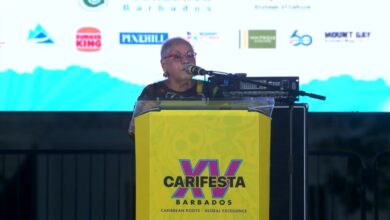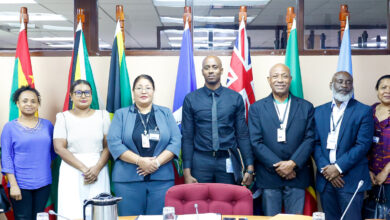On the occasion of the celebration of International Women’s Day, 2017, I take this opportunity to wish all women and particularly those in statistics all the best. In the Caribbean Community (CARICOM), the contribution of women to statistics in the R egion must be undersc ored. Women are at the helm in t he Member States of The Bahamas, Dominica, Jamaica, Montserrat, Haiti and St Vincent and the Grenadines as well as the Associate Members of Anguilla, Bermuda and Cayman Islands. In what follows we highlight t he case of Jamaica and the successful outcomes that can be essentially linked to the contribution of women in statistics.
The Statistical Institute of Jamaica (STATIN) celebrate d 70 years in 2016, having been established initially as the Bureau of Statistics in 1946 . STATIN became a statutory authority in 1984 which implies a certain degree of autonomy in its functioning. Like the other developing countries of CARICOM , STATIN has experienced its fair share of challenges in its effort to fulfill one of its key goals of making available timely, relevant and accurate statistical information and services consistent with international statistical standards to its clients. Inadequacies in human and financial resources including skilled staff to satisfy th e increasing demands for statistics and specifically to fund the data collection, compilation and dissemination act ivities affect all National Statistical Offices (NSOs) of CARICOM. It can be argued though that STATIN has consistently produce d statistics r equired by its clients more than many of the other NSOs in CARICOM.
The leadership and management of STATIN have undoubtedly contributed to making STATIN what it is today. Going back in history, there are two leaders of STATIN who perhaps have made sterling contribution s to setting STATIN on the right path to success. The first is former Director of Statistics and the first Director General of STATIN, the late Carmen Pearl McFarlane , who worked her way up the ranks to become Director of Statistics in 1971 and then led the conversion of the then Bureau of Statistics to a Statutory Authority in 1984. Undoubtedly this move set the foundation for the solid organi s ation that is STATIN today .
The second leader of STATIN , building on the achievements of the first Director General, some 17 years after sought to create a ‘ New STATIN ’, thrusting it on a moderni s ation road which included the development of a Strategic Plan 2002 – 2005. This Director General, Ms . Sonia Jackson , who was not a statistician by training (self – proclaimed) possessed the leade rship and management skills to moderni s e and transform STATIN leading to a ripple effect in a few other NSOs across the Region to do the same . The Modernisation Plan of STATIN included reorientation of the busi ness focus of STATIN to a Cl i ent Service Culture; upgrading of the Information Technology Infrastructure; enhancing its statistical programmes and project s to produce high quality Economic and Demographic and Social Statistics; s trengthening of the Human R esources Department including the performance appraisal system ; installing General Business Processes; reviewing and upgrading the Organisational Structure; consolidating operations; upgrading the legislative framework and paying attention to funding of ST ATIN. The above was achieved with the support of a White Paper and a Green Paper which were laid in the Parliament , and at the end of her stint in 2013, she was able to develop a Business Plan for sustaining the operations of STATIN as well as overseeing the launch an electronic Data Capture System (eDACS), a first for NSOs in the Region. The current leader of STATIN, Ms . Carol Coy , is continuing the process of moderni s ation and transformation of STATIN, including revamping and inco rporating an effective Quality Assurance Framework and further reviewing the legislation given the findings during the development by Member States of the CARICOM Model Statistics Bill.
What therefore are the next steps for STATIN , and specifically to ena ble it to aid the improvement of its fellow NSOs in the Region ! The Region , through the CARICOM Advisory Group on Statistics and the Standing Committee of Caribbean Statisticians (SCCS ) is trying to develop Centres of Excellence (CoE) in sta tistics in NSOs, the background and main aim of which are the development and institutionali s ing of a permanent attachment programme of South – South co – operation among NSOs in CARICOM that can serve to build capacity among the NSOs in statistics in areas wh ere the NSOs possess competencies and also enabling the sharing of best practices . T he key vision of the CoE in statistics seeks to identify an “exceptional organi s ation ” that is consistently producing statistics or related services of high quality in a s pecific area ( not limited to the hard – core statistics but also IT infrastructure management and development, corporate business planning and Communication and Advocacy ), which c an be branded as a CoE provided it meets specific criteria. In the current disc ussion in progress on this issue at the level of the SCCS, the criteria identified include documented experience and expertise in the relevant area of a consistently high quality that is also in conformity with the internationally and regionally agreed st atistical standards; adequate staff with the relevant competencies and experience that are able to effectively share their expertise and best practices ; sustained work programme of the host NSO which is not negatively impacted by the provision of support to another NSO ; adequate infrastructure including physical office space such as a training room to be used for purposes of the CoE , adequate equipment, IT software and adequate finance as required to enable the operation of the NSO as a CoE.
STATIN , despite the challenges of financing of its operations over the years has , through the effective leadership of the current Director General and the goodwill of its staff , continued to produce outputs of high quality . Undoubtedly there are other key criteri a to be met to ensure that in the delivery of its services as a CoE, STATIN can continue to fulfill its work programme. In order for it to be the first NSO to be branded as a CoE in CARICOM , STATI N must complete the implementation of its Business Plan and must also pursue the strategic development of the National Statistical System (NSS) including improving the reliability and timeliness of the data of the key data producers in the NSS and must also complete the upgrading of its statistics legislation . Head s of Government of CARICOM recently endorsed in July 2016 an Action Plan for Statistics which contains issues and specific actions that Governments , aided by International Development Partners ( IDPs ), can address given the volume of work likely to be face d by NSOs/NSS to provide data for the 2030 Agenda for Sustainable Development, for the Small Islands Developing States Accelerate d Modalities for Action (SAMOA) Pathway for the implementation of the Community Strategic Plan 2015 – 2019 and the continued impl ementation of the CARICOM Single Market and Economy ( CSME ) agenda .
Can STATIN therefore achieve CoE status in specific areas(s) of statistics – the answer may be that STATIN is on the right road to reach CoE status in specific area(s) of statistics and wi th adequate funding by the government and the financial support of IDPs it will be able to reach that marker. Commendation s must go out to the past and present leadership and staff and particularly the women who have led STATIN in creating a stellar statis tical Institute.
By Dr. Philomen Harrison, Project Director, Regional Statistics,
Caribbean Community (CARICOM) Secretariat





